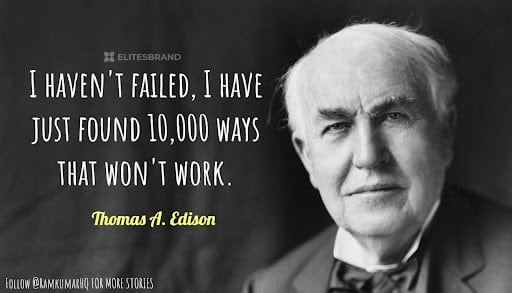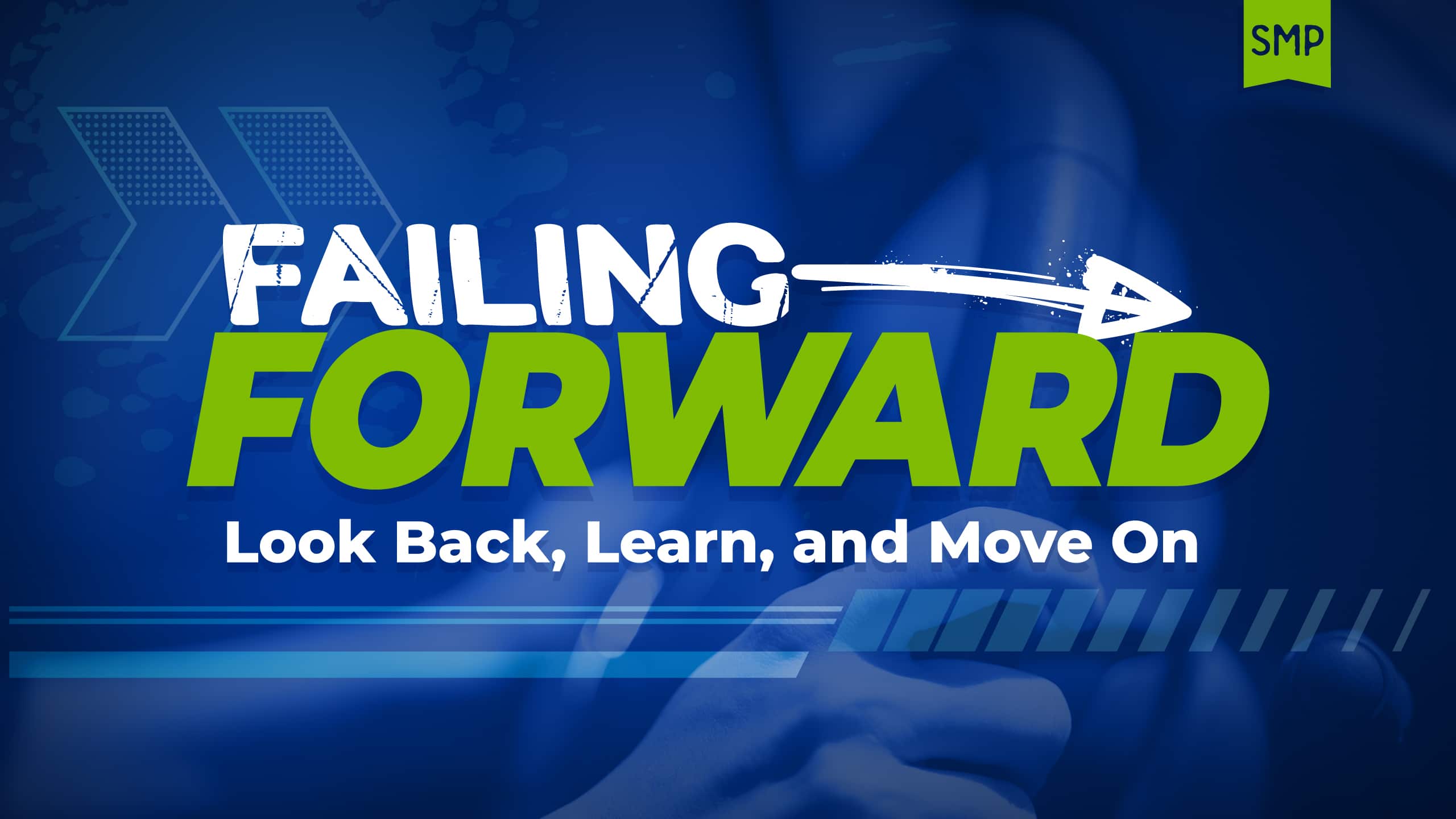Many years ago, Kim and I were introduced to the concept of “failing forward.” New entrepreneurs are often afraid of failing, but failure is where the lessons take place. Failure is where you learn. Failure is where you get humbled. There isn’t much as dangerous as a young entrepreneur who has had great success and no failure. They are a ticking time bomb, and when the failure happens, and it will, it hits them HARD.
In business, you have to be willing to fail. This has always been one of my strengths. Kim loves to tell people that I just jump off the cliff and figure out how to build an airplane on the way down. I’m not always the most calculated, but being willing to fail opens up opportunities for me that most would never have because they stopped at the first sign something wasn’t a sure thing.
In 2008, we failed big. We lost our auto repair shop and went bankrupt. I learned so much from that experience. The biggest thing I learned is that I never want to go through that again. I learned to never read your own press clippings. I also learned that if I’m going to be a businessman, I need to be the best businessman I can be, understand my weaknesses, and surround myself with people who are strong where I am weak.
The failure of Peak Automotive allowed me to start a new business that was a much better business because I learned some very hard lessons along the way. Lessons that built the foundation of what is now Shop Marketing Pros. And to be real, this business isn’t perfect because I’m not perfect. I’m positive I have more hard lessons to learn. But every time I learn a hard lesson, I’ll use it to become better. I’ll fail forward.
Failure isn’t a bad thing when you fail forward. Don’t get me wrong, it doesn’t feel good in the moment, but when you look back on it you can see where it made you better. The other option is just failure. In this case, you fail and you don’t learn from it, or you fail and you quit. This is a move backward and nothing good ever comes from it. Failure is inevitable, but when you fail, fail forward.
In this article, I want to talk specifically about failing forward and how it can make you an incredible marketer.
The Fear Of Failure In Marketing
Marketing is one of those places where the auto repair shop owners we talk to tend to have a lot of fear. They fear spending money on marketing and seeing little or no return. That’s a valid fear. Nobody wants to spend money on marketing, or anything for that matter, and not see a return. But you can’t allow this fear to paralyze you.
You can’t build a great auto repair business without marketing. You can build yourself a job. You can replace your income. But you can’t build a great business – one that makes you truly wealthy – without marketing. So you have to put that fear aside and be willing to fail forward.
Anyone can build a shop and keep a technician or two busy. You can do that just by doing decent work and being nice to people. No real marketing is needed. But at this stage, you own a job, not a business. You’ll never be able to truly get away from that business, and if you ever do sell it, hopefully you own the real estate because that’s the only real value.
Marketing is what allows you to turn that same shop into a large operation that is producing millions in revenue, has a general manager, and enough techs that if someone calls in sick or has to be fired, you don’t have to step in and “get under your tools.” Marketing is the difference between a shop that you shut the doors and walk away from when it’s time to retire – or you get a fat check from an MSO that acquires you.
So you have to get past the fear of marketing. You have to be willing to try new things. You have to have a “fail forward mindset” where you understand that money spent without a return actually did produce an ROI through the education it gave you.
Lessons From Failure In Marketing
At Shop Marketing Pros, we do marketing for a lot of specialty shops like Euro shops, 4×4 and off-road shops, diesel shops, etc. So when Rudy Niswanger of Renew Truck reached out to us to market his shop that rebuilds spotter trucks, we were all-in.
Spotter trucks are those funny-looking 18-wheeler tractors that they use to move trailers around warehouses and distribution facilities. Renew Truck rebuilds these spotter trucks, allowing the distribution centers to essentially have new spotter trucks without the new truck price tag or the ridiculous emissions controls that new trucks are plagued with. They do an amazing job for their clients.
One of the marketing strategies we employ for them is Google Ads. Because of their specialty, people from all over the country send them their spotter trucks to rebuild, so we knew we could capture a very targeted audience for them.
When we first launched their ads it didn’t take long for us to realize how much of a challenge this was going to be. Remember, they do spotter truck restoration and repairs, and they sell parts for spotter trucks. So let’s look at the main search terms we wanted to capture for them:
- Spotter truck restoration
- Spotter truck repair
- Spotter truck parts
Google Ads have different match types, those being broad match, phrase match, and exact match. We almost always have the best results for our clients using phrase match. Here’s the problem. Using phrase match, the following terms were triggering their ads:
- Truck restoration
- Truck repair
- Truck parts
How many of the people using those terms do you think were a potential client for Renew Truck? Exactly zero!
We got our trusty Google Ads rep involved and they helped us “optimize” the ads. Within a couple of weeks, we blew through $12k in ad budget without a single qualified lead.
I immediately had my team shut off the ads and I personally got involved in fixing the issue. Before you ask, yes, I gave my client $12,000.00. This was our mistake, and we believe in extreme ownership here at SMP. The thought crossed my mind to throw in the towel on this and say we were a couple of steps outside of our specialty. But I knew this would make us so much better at running Google Ads if we could get this right.
We spent A LOT of time going through this campaign and diagnosing it like the worst of the worst problem cars. I was a diagnostic tech in my prime so my brain just works like that, and I love figuring out hard problems. I say that to encourage you that you probably have the same skill set if you were a former tech.
The end result became a deep set of Google Ads that are 100% exact match. If someone searches the terms we have in place, they have a high probability of being a qualified client for Renew Truck, and the ads have brought in millions of dollars in new business for Renew Truck since we went through this process.
This was a true example of failing forward because owning our mistakes made Rudy a raving fan of our business and now we do the marketing for three of his other businesses which are all specialty shops in heavy-duty repair.
Moreover, it made us better at Google Ads, especially in the realm of specialty auto repair. I can say without a doubt that my team is the best in the business and I would put them up against anyone! Failing forward on Renew Truck’s ads has benefited every one of our clients.
The Power of Small Changes
In the scenario I gave above, major changes were made. We completely scrapped the old Google Ads campaigns and started from scratch. This is not the typical case, however.
Most of the time when we see marketing that’s not working, small changes can make big impacts. There are many parts that go into any type of marketing. Rarely are all of them “broken.” At the most basic level, any type of marketing is going to have these three elements:
- Audience
- Medium
- Offer / Message
The audience is the people you are marketing to. The medium is the delivery method of the marketing (Facebook, direct mail, billboard, radio, etc). The offer or message is self-explanatory.
Chances are two of the three are working. When you do make changes, you change one thing at a time unless you have come to realize and are SURE that more than one element is wrong.
Marketers that do e-commerce get into micro changes that can make big impacts. In Russell Brunson’s book, “108 Proven Split Test Winners,” he shows example after example of how small actions like changing the color or location of a button have resulted in millions of dollars in additional sales. In Donald Miller’s “Building a Storybrand,” he shows how changing the message from being about the product to being about the customer makes huge impacts on sales.
My point is this: when something doesn’t seem to be working, don’t scrap the entire campaign. Make small, calculated changes and study the impact of those changes.
Cultivating a Growth Mindset
So much of what we’re talking about here depends on having the right mindset. You have to learn to enjoy the process. You need to “geek out” on this stuff. If you have yourself convinced that marketing doesn’t work or that a certain marketing channel won’t work for you, then your beliefs will be your reality.
If, on the other hand, you go into marketing with the mindset that marketing works and that you’re a master marketer because you’re willing to do the things your competition won’t, your beliefs will still be your reality. Read that again.
Every time you fail forward you’re getting better. Every time you fail forward you’re getting steps closer to your ultimate success.
Thomas Edison famously said, “I have not failed, I’ve just found ten thousand ways that won’t work.”

Michael Jordan said, “I’ve missed more than 9,000 shots in my career. I’ve lost almost 300 games. Twenty-six times I’ve been trusted to take the game-winning shot and missed. I’ve failed over and over and over again in my life. And that is why I succeed.”

Failing forward puts you in good company! When you adjust your mindset to be a fail forward mindset, you give yourself permission to have success like most others will never achieve. The difference is you understand that success looks more like a mountain range than a hockey stick.
Balancing Risk And Innovation
Being willing to take risks doesn’t mean you are careless in your actions. I’m not recommending that you try every new trend when it comes to marketing. In fact, if you know me at all you know that I believe in using time-proven foundational marketing techniques to grow your auto repair shop. But even those foundational techniques require trial and error.
Also, if you’re new to marketing, don’t go out there and try to do everything at once. Go after the low-hanging fruit. Look at everything that’s out there for marketing and determine what you feel fits within your abilities the best and get started with those things. Master them first and then add new tools to your toolbox as you go.
Failing forward requires taking calculated risks. You are investing your marketing dollars, not gambling with them. Both can pay off big or lose big, but the odds are with a calculated investor, not a reckless gambler.
Conclusion
Having healthy fear isn’t a bad thing, but being paralyzed by fear will never allow you to achieve success. You have to be willing to fail forward and learn the lessons that allow you to go on to success. This is especially true in entrepreneurship and marketing. Most of us aren’t natural businessmen, much less born with a God-given talent for marketing. That means we have to take chances, but the payoff can be oh-so-sweet!
If you want to lessen the risk of marketing, you can always partner with marketing professionals like us at Shop Marketing Pros. Our years of experience lessen your cost of learning, and our specialty of marketing auto repair shops makes working with us less fail and more forward.
To learn more or to get started, request a discovery call here.




